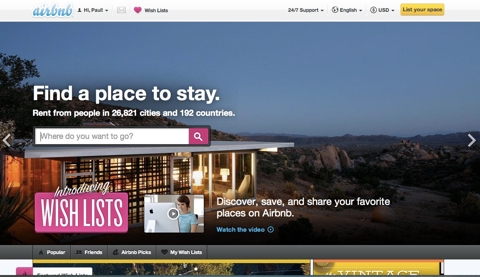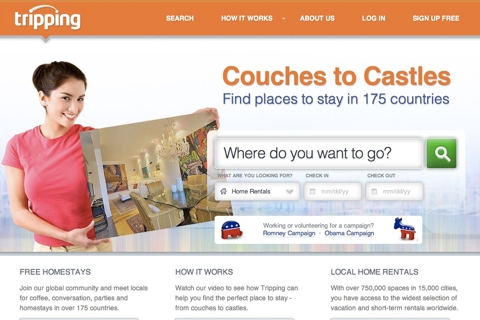As the sharing economy grows, we must increase our awareness of how different populations interact with this burgeoning economy. Women, taken as a whole, are likely to use and experience sharing services differently than men, given the unique economic and safety issues they face. For many women, the risks are much different than they are for men. As the novelist Margaret Atwood once wrote, men will say their worst nightmare is that “women will laugh at them,” while women are “afraid of being killed.”
So what does that mean for women’s participation in an economic model which asks us to share everything from our kitchen appliances to our cars to our spare bedrooms? What steps can sharing economy services take to address the risks that women take using the services?
By looking at a few businesses and services within the sharing economy, we can draw some worthwhile, if not universal, lessons about how women might engage in this brave new world of sharing.
CouchSurfing

Much ink has already been spilled on the topic of safety within the CouchSurfing community. And not for nothing; there are few scenarios that require more trust than sleeping in the living room of a stranger you just met online.
Couchsurfing’s mission is to “create Inspiring Experiences,” and its goals are lofty. It attempts to take couchsurfing (lowercase) out of the realm of broke slackers and transform it into an approach to lodging embraced by a global network of curious, likeminded travelers of all ages..
Since launching in 2003, some 4.5 million users from around the globe have created profiles on the CouchSurfing website. According to the site, about 47 percent of those users are women.
Despite the near gender parity among its users, CouchSurfing has been criticized for putting too much emphasis on personal safety tips and not taking enough responsibility as a company to ensure the safety of its users (by, for instance, requiring rather than recommending that users verify their identities). In a 2009 article for Bitch magazine, journalist Mandy Van Deven asks bluntly, “Is CouchSurfing.org Safe for Women?”
Unreported incidents of gender-based misconduct abound; one hears about them through other members in the CS Groups, but not from CS leadership (CS did not announce the Leeds case until after it was all over the media) or through the site's institutionalized safety measures.
It's hard to take these safety measures seriously when some of the men who are accused of attempted or completed sexual assault are actually well-known in CS community and have hundreds of positive references and when they require a woman to go public with information that is humiliating and traumatizing.
The “Leeds case” Van Deven refers to above concerns a female CouchSurfer who in 2009 was allegedly raped multiple times by her male CouchSurfing host. Van Deven acknowledges that the incident “isn't your typical CouchSurfing experience.” A s CouchSurfing spokesperson Heather O’Brien says, “If you were to consider a city of 4.5 million people, I think we have an incredibly low crime rate for a community of our size. But still, whenever strangers meet, there's that element of the unknown.”
Of course, CouchSurfing isn’t a city, but rather a self-selected network of individuals. And while it’s true that there’s always an “element of the unknown” when strangers meet, that doesn’t free the company of responsibility to its users.
Anecdotal evidence suggests that although women make up nearly half of the CouchSurfing community, they may approach CouchSurfing experiences more cautiously than their male counterparts.
“Speaking from my own experience as a female traveler, and from stories that I've heard from our members, I would say that women generally need to do a little bit more due diligence perhaps in checking the profile and the references of the members that they choose to interact with,” said O’Brien. “Very often I've heard from other solo female travelers that they choose to just stay with other women or with couples.”
Hana Askren, a New York City-based financial journalist who started CouchSurfing as a student in 2006, has had similar experiences. “I always felt safe [while CouchSurfing], but I always allowed for the possibility that I might not,” Askren says. “I think women are probably more likely to have someone go along with them when they go to the [host’s] place.”
She added that women who’ve come up in the Internet age are already conditioned to keep personal safety tips in mind. “There's sort of a standard script that women are taught to follow when they do online dating: meet the person in a public place, etc., etc.,” she said. “So I feel like these things are, maybe not standard, but widely known as things you should do.”
Airbnb

Airbnb shares many traits with CouchSurfing. Founded in 2008, the company describes itself as “a trusted community marketplace for people to list, discover, and book unique accommodations around the world.” Unlike CouchSurfing, which strictly forbids money from trading hands, Airbnb enables users to charge other users to stay in their home.
Airbnb has also had a major safety violation within its community make headlines. Last year, a woman who blogs under the name “EJ” wrote a post detailing how her home was ransacked, her privacy violated, and her identity stolen by an Airbnb user who, throughout the week he was staying in her home, sent friendly updates and thank you messages to his host, even as he was trying on her clothes, burning her possessions in the fireplace (with the flue closed), and stealing her electronics. The damage to EJ’s apartment, and her psyche, was so great that she felt she had to move.
EJ praised Airbnb for its “amazingly kind, caring response and support” in the days after the incident, though she also called out the site for “disallowing the exchange of personal contact information until the point in which a reservation is already confirmed and paid for. By hindering my ability to research the person who will rent my home, there is an implication that airbnb.com has already done the research for me,” she wrote.
Though there was some initial backlash against the company over the incident, the perception one gets online is that Airbnb responded swiftly and appropriately to the crisis. That may be one reason why a slight majority of all Airbnb users are women. According to an Airbnb spokesperson, 51 percent of all Airbnb users are women, and that number jumps to 55 percent in North America.
Airbnb’s slight edge over CouchSurfing in terms of female membership may also have something to do with Airbnb’s status as a public company (remember, CouchSurfing was a nonprofit for most of its existence) or its emphasis on financial exchanges that may lend an air of legitimacy to the service.
Tripping

Might a woman-founded company have different gender outcomes than companies founded by men? (Airbnb and CouchSurfing both have male founders.) Tripping is another service geared towards travelers looking for housing, and it was co-founded in 2009 by Jen O’Neal, along with Nate Weisiger. The site was founded by a woman and designed with women users in mind. O’Neal says she created Tripping “specifically to give female travelers a safe way to connect with local people.”
She adds, “To attract women to Tripping, we've partnered with fantastic organizations like Girls in Tech and we offer networks exclusively for female travelers.”
Despite these efforts, a slight majority of Tripping’s users (52 percent) are male.
Reducing Risk and Tapping the Potential
Sustainability strategist Andrea Learned says that companies like CouchSurfing, Airbnb, and Tripping still have not tapped into the full potential of female users.
“Women are not going to be the earliest adopters of this sort of thing,” Learned, the co-author of Don’t Think Pink, says. “They're going to put their toe in the water, they’re going to ask their friends, they’re going to linger on those sites and see how women are commenting, they’re going to pay attention” to how well and how quickly safety breaches are addressed. “It's a really crucial time for these companies to be doing exactly what Airbnb did” in the wake of the EJ incident, she says.
“I believe women are willing to take a little bit of risk to get into [the sharing economy], because the whole idea of sharing is very natural to them,” adds Learned, citing research on how women are conditioned to seek connection and commonality. “Women will cut a business slack to a certain degree, but within a short period of time, they're got to see that response and that transparency.”
O’Neal adds that allowing users to communicate with each other is also key. “Collaborative companies should…make it easy for female users to connect with each other on the platform,” she says. “By encouraging these social connections to develop, female users often feel more loyalty to the community and thus the company itself.”









